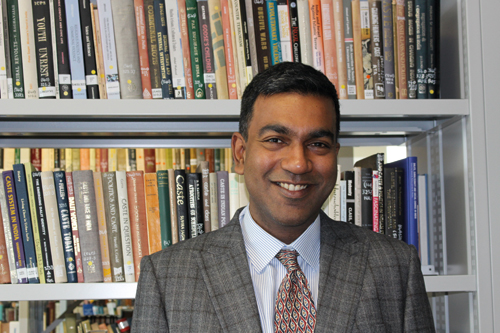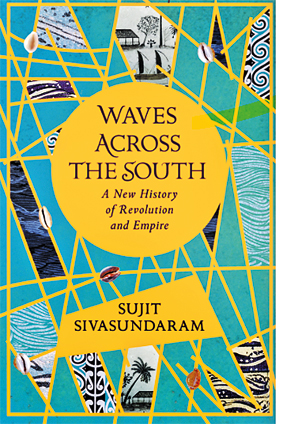Uncancelling those cancelled histories

Sujit Sivasundaram
Sujit Sivasundaram has won the ninth British Academy Book Prize for Global Cultural Understanding for his latest book ‘Waves across the South: A New History of Revolution and Empire’.
The book shifts our viewpoint of the British Empire from Europe and the Atlantic to the dim hinterlands of the Southern seas and a gamut of traditional peoples from the Maoris to the “Bombay Parsis and sealers living with Aboriginal women in Tasmania”, showing how these indigenous peoples from the Indian and Pacific oceans asserted their place and future as the British Empire expanded.
Their stories are told “combining compelling story-telling with meticulous research” the judges said – ‘a master class in what can be achieved through exceptional research’.
Revealing the win was ‘a great surprise’, Sujith said the book was a ‘collective effort’- “I have benefited enormously from the advice, questions and writings of others. One of the good things about winning a prize is that it is possible to share it with other people and to say thank you. And indeed, it is also possible to share it with many people in Sri Lanka who have been important to my studies and research.”
A product of S. Thomas’ Prep School and the Colombo International School, Sujit Sivasundaram is Professor of World History at Gonville and Caius College, University of Cambridge, and has authored, among other works, Islanded: Britain, Sri Lanka and the Bounds of an Indian Ocean Colony, published by University of Chicago Press in 2013.
Below are excerpts from our interview:
- In your childhood in Sri Lanka, what were your passions and interests? Did you, even as a boy, notice veins of cultural/ historical realities in the island?
It seems a long time ago that I was a child, so it is a bit difficult to reach back and make a judgment. Memory plays tricks and as a historian one of the things I’m interested in is precisely this – how we alter our memories and how narrations of the past lead into our present senses of ourselves as individuals, or our conception of ourselves as part of a people or nation……I was introverted and rather shy, but despite this intensely interested in people and what made them tick. I think this is what led into my historical research rather than the observation of any ruined site.
- Something on what caused your antipathy to the subject called social studies at school?
It was all the memorising of dates and facts and the multiple choice questions and answers. History in this rendition is a closed book; it is a sequence of well-known bits of information and there is a right answer and a wrong answer. It is also authorized by the state and so the purpose of history is primarily to buffer the nation. But this is the opposite of what it is as a research field. For good history is about making people ask questions anew, it is about finding new ways of interpreting past societies against our own. It requires a great deal of ingenuity, imagination and a sense too of present possibilities and politics. One needs to be brave to leave the politics that so heavily weighs down on history to one side in order to ask about history beyond the nation state and about history which opens up new ways ahead for human societies when they need inspiration or direction.
It is also the case that historians today are rightly concerned about how to challenge modes of persistent inequality in the world.
- What first gave you the idea for Waves Across the South?
There were various routes into the book. First, there was my teaching of brilliant undergraduates at the University of Cambridge who took a course with me on the histories of the Indian and Pacific Oceans. I realised that there was a lot to be gained by writing a story about how the history of the world could be narrated from the Indian and Pacific Oceans rather than from the Atlantic. Second, I started to think about how the arguments in my previous book on Sri Lanka, ‘Islanded: Britain, Sri Lanka and the Bounds of an Indian Ocean Colony’ (2013), could be applied to other island societies. In that previous book I argued that our island was a colonial laboratory for modes of state-making, cultural definition, scientific knowledge and orientalist scholarship among other themes. Third, I wanted to develop a way of writing world history which was new, not to flatten small places or to make them equivalent with each other, but to juxtapose different stories and from there to generate a broader picture. This would allow me to respect the difference between a Maori perspective and a Khoisan perspective, but at the same time to bring them together in an arc of writing.
- How did you get into the souls of different Southern sea peoples from the Maori to Parsis and sealers in Australia? How long/ arduous/ enjoyable/ instructing was the work?
I don’t think my role is to enter souls and indeed I didn’t try to do so. The best I can do is to gather fragments and do my best to get as close as possible to people in the past and especially to colonized people and people of colour. This meant that I began with works written by scholars in each of these regions. To be clear, the book builds on existent knowledge and work by others. A book like this has to do this. Then, I consulted archival sources in many of the sites covered in the book: the intention was to get away from sources in London or Paris and to begin with sources in the Indian and Pacific Oceans. The kinds of materials available ‘in situ’ are of a different order and help getting beneath some of the top-level colonial wrangling. Additionally, I destabilized some of the colonial textual sources by integrating objects and visual images with the view that in fact it is possible to get to different routes of interpretation with these materials.
- The work was also a piece of storytelling. How do you charge your writing batteries? Can we speak about yourself as storyteller/ creative writer?
 It is up to the readers to decide whether it is enough of a story or not but the jurors have certainly described it as a set of stories. The book presents an argument about the ‘age of revolutions’, the period of the American, French, Haitian and Industrial Revolutions among others. This period is often said to have consolidated many things we take for granted in our world: notions of rights, belonging, the nation state, reason, militarism, technology, free labour etc. It is taking that argument to a new set of vantage points, by arguing that the age of revolutions was about indigenous presence, resistance and association in the Indian and Pacific Oceans. It is also about the response of the British empire which mounted a counter-revolt. The dynamic of indigenous revolutionary potential and imperial counter-revolutionary response is what constitutes the age of revolutions in this book. Thinking about that broader canvas helped charge my batteries.
It is up to the readers to decide whether it is enough of a story or not but the jurors have certainly described it as a set of stories. The book presents an argument about the ‘age of revolutions’, the period of the American, French, Haitian and Industrial Revolutions among others. This period is often said to have consolidated many things we take for granted in our world: notions of rights, belonging, the nation state, reason, militarism, technology, free labour etc. It is taking that argument to a new set of vantage points, by arguing that the age of revolutions was about indigenous presence, resistance and association in the Indian and Pacific Oceans. It is also about the response of the British empire which mounted a counter-revolt. The dynamic of indigenous revolutionary potential and imperial counter-revolutionary response is what constitutes the age of revolutions in this book. Thinking about that broader canvas helped charge my batteries.
- What would you say were the most startling new insights you gained from working on the book?
I was surprised by the number of ways in which a story in one region had ramifications in another separate region, this is something that scholars have missed because histories are normally organized by ‘nation’ or ‘region’ and so the wider connections are lost. So to give one example, Tipu Sultan of Mysore is a well-known figure. He is the ruler of Mysore who stood against British imperialism and was vilified by the British for doing so, as an ‘oriental despot.’ What is not much known is his connection to Mauritius, to which he sent an embassy which arrived in 1798. This embassy in turn arose from the arrival in Mysore of Francois Ripaud from Mauritius. What this incredible embassy reveals is that Tipu’s resistance and ideology was forged partly in an Indian ocean force-field. Whereas the British exaggerated his connections to France and while historians still talk of his ‘republican’ leanings, in fact what we have here is a South-South story of solidarity.
- What kind of conclusions about the British Empire do you arrive at at the end of this foray into so many of the Southern seas’ nooks of habitation? What conclusions in general?
This book is a critique of the British Empire and its sinister workings, since the argument is that indigenous peoples made a stand but their stand as well as their ideas, skills and so on were folded into the new British Empire. In this sense the British Empire reversed the possibilities of the era in the global South and indeed co-opted those possibilities within itself. Additionally, I argue that these indigenous histories were lost as History was written in a propagandist way from c.1850 and while at least one early British imperial historian I discuss at the end of the book, Robert Montgomery Martin, collected Indigenous skeletons. He also worked in Ceylon. The sinister workings of the British Empire extended to the silencing of this story. In my acceptance speech for the award, this is why I described the book as an act of ‘uncancelling’. While imperialist writers have cancelled, it is time to bring out into the open again.
- As a Professor of World History, what areas make your work particularly enjoyable?
It is a privilege to hold this post and yes, it is a joy too. But the challenge is to share this privilege with others and to make an university such as mine open to more and more people and to more and more researchers regardless of their backgrounds and starting points. I hope for instance to raise funds for Sri Lankan researchers to complete PhDs at the University of Cambridge in the period ahead. Since work like this is very much part of a conversation, it is important to ensure that the conversation goes on in generations to come. I have been really pleased to see so many people who are coming through, who are somewhat younger than I am, who also wish to write in this field. In the midst of all the challenges in Sri Lanka, the younger generation certainly provides a reason for hope.
- What new ideas await in the future?
I am trying not to rush into another book – so I will take it slowly. But I am hoping to return to Sri Lankan history more narrowly construed, so do watch out.
(‘Waves across the South:
A New History of Revolution and Empire’ priced at Rs. 5000 is available at Sarasavi and Barefoot Bookshops)


